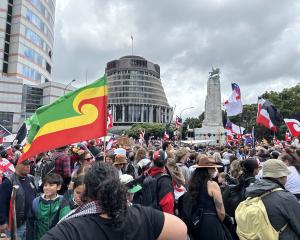Murray Grimwood canvasses two approaches to local government, one "private" and resource-heavy, the other sustainable and community based.
Two divergent approaches to local government are beginning to emerge as restraints and demands intensify.
Only one will be the right one, only one will (initially, at least) be chosen, and it would be best if they were one and the same. On the one hand, we have Rodney Hide and the monetarists.
To understand them, where they came from and where they are going (or not), you need to understand where money came from and where it is going (or not).
Money started as a representation of real stuff being traded, being made of the most valuable of the real stuffs - gold and silver - to be as transportable as possible.
Real bullion, one-for-one, underwrote early banks until activity outpaced supply, at which point we got "fractional-reserve" banking.
Meaning real stuff underwrote only a fraction (perhaps one dollar in 20) of what was loaned.
About 1970, even that "real" underwriting couldn't cope, and money floated off related to - in real terms - nothing.
The Achilles' heel of this system, of course, is that it has to grow, has to chew more from in front than it pays back behind.
Or die.
A whole generation of "experts" have come through since that unpinning, disciples of a creed they take for real, using buzz-words like economy, growth, GDP, jobs (when was the last time anyone evaluated what a "job" is?) and productivity.
Rodney Hide represents the extreme end of those who believe that this man-made contrivance, temporarily constructed to facilitate the accelerated extraction of resources, is real and forever.
At the time the money-balloon was being untethered, others set their minds to investigating how long it could continue to go up, up and away - and to when and where it would come back to earth, as balloons are wont to do.
They understood that the exponential nature of growth was unsustainable, worked out that the first crucial resource to go short-supply would be energy, and worked out when. They realised that there would be competition for resources but failed to anticipate the first manifestation of it, namely the privatisation moves which started in the 1980s.
In hindsight, of course, those moves were nothing more than initial indicators that we lacked infinite possibilities, that we were close to the ceiling. Those thinkers are currently represented by the Transition Town phenomenon and by the rapid expansion of farmers markets and garden networks, and by a host of things like Sustainable Dunedin, and Enviroschools.
Collectively, they understand that energy curtailment means transportation curtailment, means localisation of everything.
Included in their everything (following the logic) is ownership. So we have two schools of thought in stark contrast.
On one hand, a bunch of balloonists aiming for the stars; on the other, folk who are sure the yellow brick road ends in Kansas.
The first assume their system is all that is needed, that money will solve everything (and, incidentally, that they will be the best destination for it) and that there is no need for community.
The second see it as all about community, all about sustainability, and that a new fiscal system will have to be organised. Facing both schools of thought is the problem that all the infrastructure we in the First World take for granted - like sewers and water reticulation - is a pot of spaghetti that has been bubbling for 100 years.
Just maintaining the existing stuff will be an increasing challenge.
For instance, nobody yet has a viable replacement for plastic pipes, post oil.
The best (as in: the most useful) example of a community attempting to maintain during a prolonged constraint is Cuba, and it is both inspiring and worrying. Make no bones about it, we are up against the limits of resources now - the sheer physical restraints of water, land, pollution and activity-allocation.
We can approach that phase in dog-eat-dog fashion - minimal governance and private monopolies - or we can face it as communities, nurturing the whole.
Mad Max or The Good Life.
Rodney Hide or Felicity Kendal.
I've already made my choice - bring on the referendum!
Murray Grimwood is a Waitati farmer and occasional commentator.











